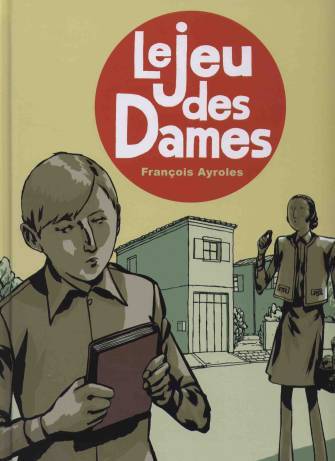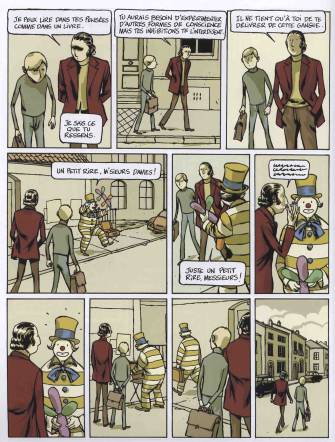 Home > Bart Beaty's Conversational Euro-Comics
Home > Bart Beaty's Conversational Euro-Comics Bart Beaty Reviews Le jeu des Dames, by Francois Ayroles
posted May 29, 2007
Bart Beaty Reviews Le jeu des Dames, by Francois Ayroles
posted May 29, 2007

 By Bart Beaty
Francois Ayroles
By Bart Beaty
Francois Ayroles is one of the most difficult cartoonists to fathom. There are few cartoonists whose short work I treasure as highly. His short book,
28 Moments cles de l'histoire de la bande dessinee (
28 Key Moments in Comics History) is one of the funniest things that I have ever read. His mini-comic,
Mon Killoffer de poche, probably is the funniest thing that I've ever read. And his
L'Association-published experimental comics like
Les Parleurs and
Les Penseurs are formally innovative and witty as all hell. But like a band that cranks out great singles without ever producing a spectacular full-length album, Ayroles long works have never fully demonstrated his tremendous talents. He lacks that one big book that critics point to and say: See? Here is the work of a genius!
Playback, based on the
Chandler story and produced with
Ted Benoit (and his only work available in English) is a fine book, but one that constrains the formal inventiveness that is his strong suit.
Enfer Portatif, his first book for
Casterman, was stronger, an oddball tale of an oddball couple. His new book,
Le jeu des Dames (Casterman) mines similar ground. It's his best album to date, but it still left me wanting more.

The story of
Le jeu des Dames owes a little to
Wes Anderson's Rushmore. A young man of high-school age falls in with an older man who is just slightly off, and this older man proceeds to teach him something about love and life. Unlike Rushmore's Max, however, Pino is not the king of the school, he is an outcast who is bullied from the very first panel of the book. Androuze, the man who takes an interest in Pino's affairs is, well, it's hard to say what he is. A con man, an interloper, a dream? He scams meals, steals (women's) clothes, and has Pino's tooth extracted by an old man in the village. If none of this seems to make sense, you're on the right track.
Le jeu des Dames has a dreamlike structure that is alluring without being fully satisfying. It is hard to tell if any of this book is meant to actually be happening, or if it is all just a fantasy, a wish, or a dream. Certainly any book in which the lead suddenly finds himself naked in a public park will lead one to suspect that we are dealing more with neurosis than fact. The whole book deals with Pino's inability to comprehend women, particularly a young woman for whom he develops a romantic attachment. So are the women in Pino's life so unreal to him as to alter his reality? Or is this all in his head from the get go? It is to Ayroles' credit that questions such as these are not easily answered.

The greatest strength of the book is Ayroles' art, which is nicely composed despite a decision to work almost exclusively in medium shots. He plays his characters with a certain (dream-like) flatness and lack of emotion, and that is wonderfully highlighted by his thick lines and well-placed shadows. Indeed, this is a lovely book to look at, and a smart story to boot. My reservation stems not from a flaw in the work itself, but from the enormous expectations that the artist's previous works have developed in me. When you're longing for genius sometimes the genuinely interesting underwhelms. I'm still looking for that one outstanding novel from Francois Ayroles, one of the great short story talents in comics.
*****
Le jeu des Dames, Francois Ayroles, Casterman, album, 55 pages, 2203391723 (ISBN10), January 2007, 13.75 Euros
*****
To learn more about Dr. Beaty, or to contact him,
try here.
Those interested in buying comics talked about in Bart Beaty's articles might try
here or
here.


